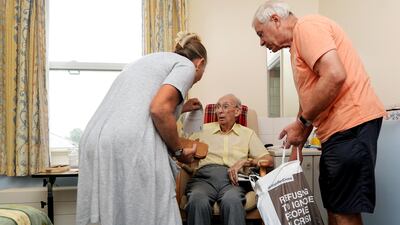Over the past few weeks the UK has been gripped by a heated discussion on the subject of social care and who should pay for it, and how – if it is done through taxation – it should be collected. It is going to be paid by National Insurance, a tax that focuses on younger, less affluent workers.
Over several weeks the discussion appeared to be nothing more than an undignified row about who should be opening their cheque book to cover the cost. It demonstrated a flaw in our approach to the subject: that we see care of others, especially care of the elderly, as an issue of finance and tax, and in particular as a burden.
But what the pandemic actually showed is how many people around the world care deeply and selflessly for our elderly and vulnerable. I say "our" rather than "their" because they are part of our village, part of our extended families, part of our societies. They are us. We are them. To think of them as a liability is unfortunate.
For me, as someone who is an unpaid primary carer – like millions of other people around the UK and the world – this approach to care misses the crux of the conversation. People seem to focus much more on the cost of care, but the question should be, what is its value? And how do we maximise it?
There are plenty of studies on the benefits of intergenerational living for young people and society. Interaction and engagement has benefits for the elderly. But here’s the thing: it also has massive benefits for young people, giving them a sense of identity, culture, history and space. It builds community ties and adds to a feeling of rootedness.
A vision of social care also means benefits of more jobs, with more value. This is something missing from the conversation. The hours and effort put into caring have not been discussed enough. Historically care has always been a "woman’s job" and done for free. And as with many so-called "women’s jobs" they are unpaid and considered lacking in stature.
But caring for people is a skilled and difficult job, and it ought to be estimated properly. So by thinking of the value of care rather than its cost, millions of new high value jobs can be created. It is part of the growing service economy.
Any discussion of care also means recognising, supporting and resourcing the millions of unpaid carers in the informal care sector that provide the vast majority of care. Unpaid caring for loved ones has a massive impact on the carers. It is said to have an impact like post traumatic stress disorder. And there is a knock on effect on the families and workplaces of carers.
And when caring for the elderly or vulnerable is added to caring for young children, this is the plight of the "sandwich generation" – those in their thirties or forties, who care for both their elderly parents and young children. This is the time that this generation is at their most productive in the public space and the workplace, but squeezed by weighty responsibilities. With no one to help, they are burning out, looking after parents and children.
All of this is being driven by massive economic, demographic and socio-cultural changes. Our populations are older than they have ever been.
Our understanding of needs and attitudes towards who should be cared for – especially for children and pre-retirement has also changed. Our societies have changed when it comes to women not being home as much to care for everyone.
When the UK’s National Health Service was launched in 1948 it was a radical proposition. The first of its kind in the world, it was free at the point of service and was according to need, not ability.
It was part of a bigger radical transformation by establishing a welfare state. In the post-war period there was a consensus that we had to do things differently to move forward from the devastation of the previous years, but to also build something fit for a future where deprivation, suffering and indignity were reduced and where every person had the right to care, health, education and shelter.
As we start to plan beyond for health needs beyond the pandemic, we need a vision that addresses the kind of society we are now and create a model for care and its role in our families, communities and nations. It is not an afterthought or a penalty. It lies at the very heart of societies because everyone needs it in some way or another.
When the NHS was launched in 1948 it was transformative. The same happened when education was rolled out for children. Now, our societies need transforming again. That should be seen not as a burden but an opportunity.


